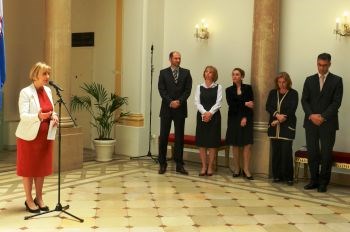- Published: 05.06.2012.
An official ceremony commemorating the upcoming Croatian Diplomacy Day was held at the Ministry of Foreign and European Affairs on Tuesday, 5 June 2011
On that occasion, Minister of Foreign and European Affairs Vesna Pusić addressed the ministry staff present and thanked them for their contributions in their work to date
On that occasion, Minister of Foreign and European Affairs Vesna Pusić addressed the ministry staff present and thanked them for their contributions in their work to date.She stressed that the current focus of Croatia's foreign policy, in addition to preparations for the upcoming membership in the European Union and participation in multilateral organisations of which the Republic of Croatia is a member, is directed at making an active contribution to the stability of the region and offering assistance to countries aspiring to membership in European and Euro-Atlantic integrations.
In that context, she emphasised Croatia's willingness to share its experiences with the countries of South East Europe on that path. Through the work of the Council for Transitional Processes, which will operate as a centre of excellence, Croatia will transfer its experiences and knowledge attained during its accession processes to NATO and the European Union.
She also announced the signing of several bilateral agreements on Euro-Atlantic partnerships with countries of the region, the first of which is planned with Montenegro during her official visit to Podgorica in the following week.
The minister also touched on a number of other projects in which the Ministry of Foreign and European Affairs is actively participating with other state administration bodies and giving its contribution, aimed at improving cross-border and cultural cooperation among the countries of the region.
Croatian Diplomacy Day is 7 June, and traditionally celebrates the historical event from 879 when Pope John VIII sent a letter to Croatian Prince Branimir, informing him that Rome gave its blessing to the prince and the entire Croatian people, and recognising his “sectoral rule over the whole of Croatia”. This was the greatest international recognition of that time which, in today's sense, recognised Croatia as a sovereign state.



